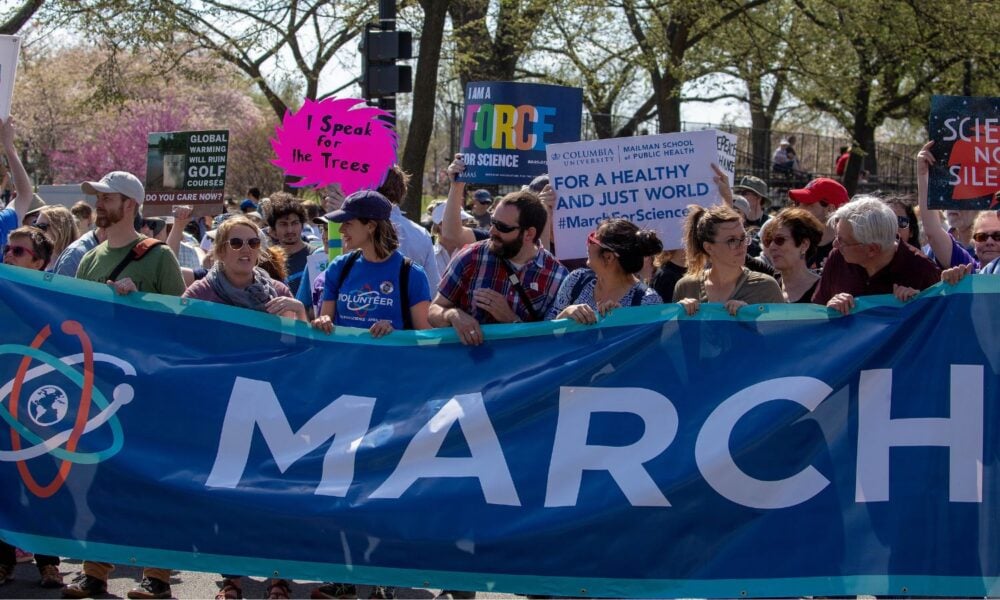On the morning after the 2016 election my fellow scientists at the National Oceanic and Atmospheric Administration (NOAA) and I exchanged stunned looks as we passed in the hallway. We understood—and feared—based on the 2016 campaign how the new Trump administration would downplay, deny, and sideline science. But our dismay soon turned to resolve: recognizing that our mission as a government science agency was more important than ever, we focused on our jobs and addressing that mission.
Things weren’t perfect. Indeed, UCS documented more than 200 attacks on science by the first Trump administration. Colleagues left the government or were reassigned or relocated. Some federal science agencies experienced significant reductions in capability due to retirements and other departures. EPA lost nearly 6% of its scientific workforce between 2016 and 2020, affecting their ability to protect public health and safety immediately and in the long-term. A climate of intimidation and fear arose among employees. But by and large we persevered; most of us remained in the same position with the same roles and responsibilities, fulfilling our organization’s mission, and being good public servants.
This time around President Trump is more willing—by whatever means necessary—to misuse, discredit, disregard, and defund science. He has promised to fire government scientists and dismantle science agencies. He and his administration view science as a threat to their plans to upend government and implement Project 2025, which lays out several anti-science actions, notably restricting EPA and disbanding NOAA. President Trump will likely target specific science agencies and individuals, for example those in public health, environment, renewable energy, and climate offices who espoused scientific facts that run counter to his public pronouncements. Some of his supporters see this as an opportunity to enrich themselves through the commercialization of federal science-based duties, products, and information.
There will be challenges, budget cuts, deregulation and policy rollbacks, and hostility posed by skeptics and those with special interests, political motivations, or an anti-science agenda. Science has been downplayed in other administrations as well through reduced funding, hiring freezes, offers of early retirement, and politicizing science. But government science survived—and must continue to survive—because when science is sidelined, people get hurt. There remain many foundations for hope; institutions and opportunities for scientists and their allies to mitigate the administration’s attacks and actions against government science.
An independent national science enterprise is essential to public health and safety
Science never appears so beautiful as when applied to the uses of human life.
-Thomas Jefferson, 1798
A robust national science enterprise independent of political and corporate pressure is vital to the well-being of our nation, its people, economy, security, and our environment. Investments in nonpartisan government science provides safeguards that protect Americans from polluters and wealthy corporations who put profit ahead of people.
The US science infrastructure has been the envy of the world. It accounted for over 30% of global R&D expenditures in 2021. A substantial portion of this budget was government funding and corporate tax benefits, with the federal government serving as the largest source of funding for basic science R&D.
We have seen how climate change, environmental degradation, pandemics, growing water and energy needs, and global insecurity pose ever greater threats to public health, safety, and well-being. This only increases the need for better, more timely, and accurate science. We all—science workers and those who rely on their work—must do our part to protect and defend the role of science in understanding and addressing these critical issues. We need to maintain and grow our nation’s science infrastructure. We must keep the pipeline flowing through recruitment and retention of talented and independent science workers.
Your agency’s mission—and your job—may not change much
Many of the nation’s science agencies were established by legislation and have statutory mandates setting forth their missions and responsibilities to Congress and the nation. Their appropriations are determined by Congress based on law, which sets the nation’s science agenda through that funding.
A federal scientist is charged with carrying out the wishes and policies of their political leaders. But that doesn’t involve promulgating lies. We do not elect science; it stands on the facts and its own merit. Legal and statutory guardrails remain, and we must work to ensure that Congress and the judiciary enforce them. Likewise, political leaders of science agencies are bound to follow the law and scientific integrity policies, to employ and respect the peer-review process using experts, and to protect their employees from threats and illegal actions. They may need to be reminded of that responsibility by workers and their outside allies.
Don’t get caught up in the “flood the zone” noise from the White House and the 24-hour “breaking news” cycle. Focus on your duties, and don’t get distracted—or distressed—by what you can’t control. Remember why you got into science and dedicated yourself to public service. You are part of a long tradition, and an amazing institution that is greater than the sum of its parts.
Rely on leadership and senior-level people in your organization
You may recall SharpieGate in 2019. White House appointees politicized science by altering weather advisories and rebuked and muzzled forecasters from speaking the truth, thus eroding public trust. Fortunately, our senior career leadership in NOAA stood up courageously to defend science and the forecasters, and called for an investigation of politicians who violated scientific integrity. In the wake of SharpieGate, NOAA—led by its scientists—crafted and strengthened our scientific integrity policy and measures to protect our scientists and scientific programs. This guidance was expanded government-wide in 2022 to safeguard against political influence on science.
Most science workers have multiple levels of management who are dedicated to good science and to a workforce shielded from political bias. Mid-level science workers can make their senior leadership aware of any pressures and provide them with the sound science they need to promote and defend fact-based policies and guidance. Senior-level science managers, you have a duty to support and defend your workers, protect them from threats, and speak truth. It may require fortitude in this political climate, but it is vital for your employees, and for the public.
Know you have lots of support—inside and outside of government
Government science has a broad base of support, including those who use science in making critical daily and long-term decisions, and the general public. During Hurricane Harvey in 2017, our federal interagency team provided regular updates to Texas county and municipal emergency managers. They relied on our science-based guidance to make life- and property-saving decisions. They trusted the messengers and believed the science. There was no skepticism about climate change or “fake science” raised during our briefings.
Academic and private-sector colleagues and those receiving federal research funds fully recognize and support the importance of government scientists and their agencies. State and local environmental and health agencies rely on guidance and collaborations with their federal counterparts. Advisory committees, professional societies, NGOs, and other scientific organizations are great proponents and need to remain engaged. Employee unions provide moral and legal support to their members. Even the public who visit zoos, aquaria, and museums become enthusiastic advocates for science.
Federal scientists are on the front-line, dedicated public servants, essential to generating, promoting, and communicating the science that protects the public’s health and safety. One of the objectives of attacks on science is to erode morale and to sideline and force out science workers. You can’t control the rhetoric and outrageous actions and talk, but you can control your role in producing and disseminating sound science. Leaving or retiring is of course a personal decision—do act in your best interest, but don’t overreact. Consider the importance of you and your talents staying in the fight, contributing to our missions, and achieving good science for the public good. Realize that a federal brain drain will have long-lasting effects, and your expertise is needed now and in the long-term after this administration is gone. If you are thinking about changing your career path, have a backup plan, talk with others, and join groups like UCS. And remember: you are not alone in this fight to defend science.
Everyone has a role in defending science
Whether you are a government science worker, a colleague, or someone who depends on science-based information (which is everyone!), the next four years will be a long process of staying engaged in defending science. Anticipate that bad things will happen and be ready, but don’t give up too soon—do not obey in advance or give into the politicization of science freely. Ignore the chaos. The threats and rhetoric are meant to dishearten and frighten. Don’t take the bait, but be conscientious, and stick to the scientific process.
Science has been and will remain a factor in decision-making, but not the only factor. As science communicators, we all must tailor our messages and language to a broad audience while staying with what the science tells us. Push back against cherry-picked data and results, avoid anecdotal or one-off examples, and call out lies, “alternative facts,” and bad science.
You have clearly defined rights as a government employee. Know and use them for protection from hostile actions or recrimination. Document any threats to you, or attempts to alter or affect science. Understand your whistleblower rights, responsibilities, and processes. Help your organization develop scientific integrity plans and policies, and make sure they are being followed by employees and by career and political leaders.
To track censorship and misinformation, those inside and outside can preserve government data and web pages. Professional societies are concerned about threats to their own membership, but they must sustain and voice their full support for science. Communicate that as a member of those organizations. Make sure the public and the users and practitioners of science information understand its source, rigor, and credibility, and the risks to it under the current administration. Scientists in academia and the private sector, and all advocates can communicate their concerns to their elected representatives. UCS provides resources to assist workers and their allies during the new administration, and actions we all can take to protect science.
I joined the federal government because I wanted my work to help our nation. I retired in 2022 after over 33 years as a government scientist, manager, and policy advisor under Republican and Democratic presidents, after numerous continuing resolutions, furloughs, and changes in administration, years with level funding and program cuts, the sudden switch to remote work due to the COVID pandemic … and four years of threats and lies from President Trump and his appointees. But I also experienced wonderful collaborations with talented people in and out of government; creating, sustaining, and sharing important data sets; conducting rigorous research; and producing sound, fact-based, peer-reviewed results that informed good policy and decisions to benefit the American people. I have handed the baton to other dedicated and talented individuals to carry on our mission as government scientists, a mission vital to our health and well-being, and our global economic competitiveness. We all must support and defend this national treasure.

